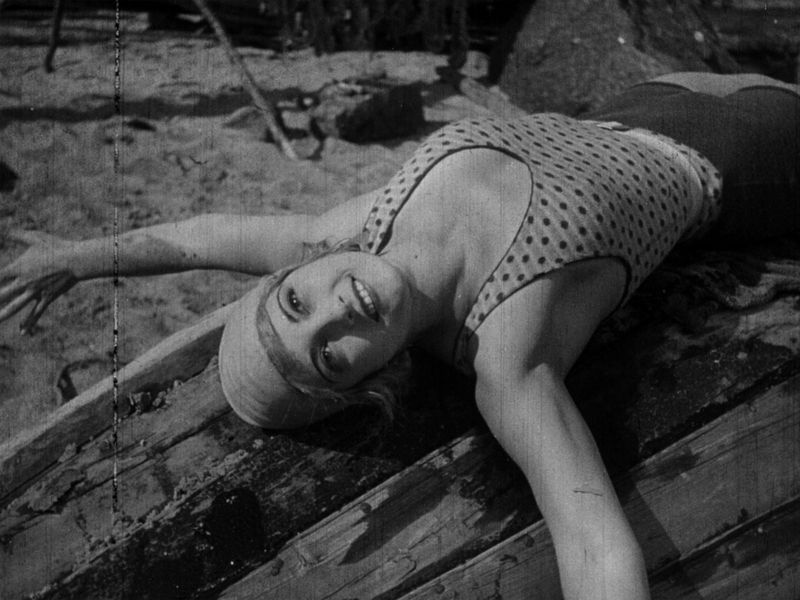KIRE LAINED / WELLEN DER LEIDENSCHAFT
(Waves of Passion)
Wladimir Gaidarow [Vladimir Gaidarov] (EE/DE 1930)
Kire lained was Estonia’s first international co-production, made under the aegis of Russian actor Wladimir Gaidarow’s newly formed German production company, Wladimir Gaidarow-Film, and the Estonian company Urania-Film, which was registered at the Ministry of Court and Internal Affairs of the Republic of Estonia on 24 January 1930. Urania-Film was founded by the then-representative of the U.S. Fox Corporation in Estonia, Richard Ley, along with Sigrid Ley and Roman Birkenberg (all of whom lived in Estonia and were Estonian citizens). It was the only film produced by either company.
This was also the first and only time Wladimir Gaidarow (Vladimir Gaidarov, 1893-1976), also playing the male lead, went behind the camera. Starting his acting career in 1914 at the Moscow Art Theatre, Gaidarow appeared in a number of Russian films up until 1918 (he can be seen in Father Sergius, also showing at this year’s Giornate). In 1920, Anatoly Lunacharsky, head of the People’s Commissariat for Education (Narkompros) sent Gaidarow and his actress companion Olga Gzovskaya (they married in 1926) on tour as part of a theatre troupe, performing in the Baltic countries as well as Berlin in adaptations of Russian classics and cabaret. According to his 1954 autobiography, Gaidarow was first approached by Fox in 1921 to go to America, but he and Gzovskaya turned down the offer; it’s been conjectured that this meeting sowed the seeds for his later collaboration with Richard Ley and partners. Throughout the 1920s Gaidarow starred in a number of important German film productions, including Dreyer’s Die Gezeichneten (1921), Murnau’s Der brennende Acker (1922), May’s Tragödie der Liebe, and Genina’s Die weiße Sklavin (1927), and he and Gzovskaya [Gsowskaja in Germany] became, in his words, “voluntary guides to the adventurous, dangerous, mysterious, and even mystical Berlin space for the representatives of the Russian artistic bohemia arriving here.”
Also appearing in Kire lained is the Slovenian actress Ita Rina, whose superb work in Karl Anton’s Tonka Sibenice from earlier the same year remains highly regarded (she can also be seen at the Giornate this year in Mario Bonnard’s Das letzte Souper). Other roles are taken by both German and Estonian performers, including leading lights of Estonian film and theatre actors Hugo Laur and Ants Eskola.
Kire lained is a classic adventure film centred around a subject of considerable significance in Estonia at the time – smuggling spirits to Finland. But passionate matters of the heart are a vital part of the plot. Writer Rex Ronney (Gaidarow) travels to Estonia with his journalist friend Raimondo (Ernst Falkenberg) to gather information for a novel on the life of smugglers operating in the Gulf of Finland. To gain access to their circle, Rex presents himself as a thief and becomes confidante to the spirit king Jaan Kõlgis (Fritz Greiner). The newcomer is tasked with taking a huge number of containers to the beach at Loksa, but the border patrol foils the plan and Bratt (Hugo Laur), captain of the smuggling ship, is captured. He betrays Kõlgis, as well as Mart Martens (Raymondo van Riel), who fell into the smuggling business because of his debts to Kõlgis, and his daughter Betty (Ita Rina), who is trying to help her father in this difficult situation. Rex and Betty fall in love, and he tries to save the girl. For fear of being captured, Kõlgis and the usurer (Hugo Döblin) try to make their way to neutral waters, taking Martens and Betty with them; Rex has to rescue his loved one and her father from this man who will balk at nothing.
The film was shot in the summer of 1930 in Tallinn and Northern Estonia, and premiered in three cinemas at once, testifying to its prestige. Ita Rina herself attended the performances in all three cinemas, her presence enthusiastically heralded by Estonian media with many a news story. The Berlin premiere took place one week later.
An orchestral score was composed by Bert Reisfeld (1906-1991), an Austrian-born composer and lyricist; Kire lained marked his debut in cinema. After emigrating to the U.S. sometime in the late 1930s, he became an arranger for Benny Goodman and Glenn Miller, among others.
Maria Mang


regia/dir: Wladimir Gaidarow [Vladimir Gaidarov].
scen: Kurt J. Braun, Hans Fischer, Max W. Kimmich.
photog: Werner Lemke, Ewald Daub.
scg/des: Karl Haacker.
cast: Raymondo van Riel (Mart Martens), Ita Rina (Betty, sua figlia/his daughter), Fritz Greiner (Jaan Kõlgis, il re degli alcolici/the spirit king), Wladimir Gaidarow (Rex Ronney, lo scrittore/the writer), Juta Jol (Leida, la ragazza del porto/girl from the harbor), Ernst Falkenberg (Raimondo Valdivio, il giornalista/the journalist), Hugo Laur (Bratt, il contrabbandiere/the smuggler), Hugo Döblin (Feigelbaum, l’usuraio/the usurer), Eduard Rebane (guardia di frontiera/border guard), E. Garray (la vecchia domestica di Martens/Martens’s old servant), ? Lehmann (proprietario della taverna/pub owner), Robert Rood (marinaio che balla/dancing sailor), Ants Eskola (marinaio a bordo/sailor on ship).
prod: Wladimir Gaidarow-Film GmbH (Berlin) / Urania-Film (Estonia).
v.c./censor date: 03.10.1930 (Berlin).
uscita/rel: 10.10.1930 (Tallinn); 17.10.1930 (Berlin).
copia/copy: DCP, 108’40” (da/from 35mm, 18 fps); did./titles: EST.
fonte/source: Eesti Rahvusarhiivi Filmiarhiivi, Tallinn.




